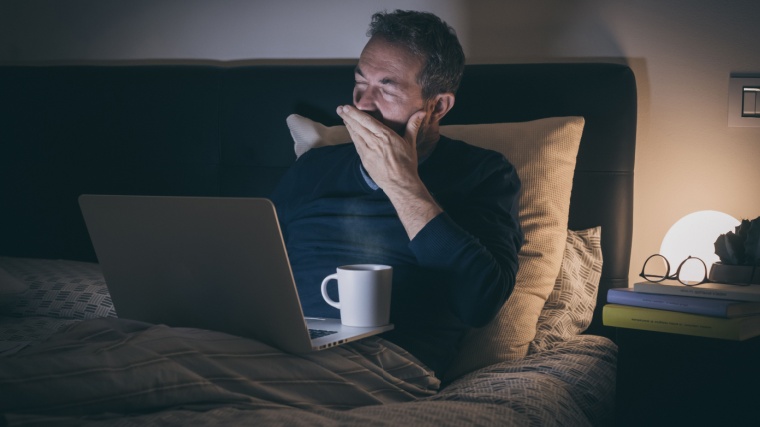When it comes to balancing the many factors that affect your health and fitness, small mistakes can really tip the scales. This is particularly true for lost sleep; missing out on shut-eye can grind your gains to a halt.
- According to a 2022 systematic review, habitually undercutting your sleep can reduce “exercise performance” by 7% or more. (1)
A single-digit decrease might not sound like much. However, if the study’s findings hold (and they do, we’ll get to that), your 225-pound bench press max could fall to 210 in the blink of an eye.
Here’s the good news: Hitting the gym first thing in the morning might stave off these negative effects, at least partly.
Sleep Loss & Exercise Performance: Science Explained
The paper in question is titled “Effects of Acute Sleep Loss on Physical Performance: A Systematic and Meta-Analytical Review,” by authors Craven et al. In case you aren’t aware, a meta analysis is essentially a study of studies.

Craven & colleagues collected and analyzed 69 existing studies that met their inclusion criteria:
- English-language research
- Controlled trials of “repeated measures”
- Adult participants with no known comorbidities
- Sleep restriction defined as less than 6 hours of sleep in any 24-hour period
Here’s what they found.
[Related: Best Pre-Workout Supplements]
Findings
“Results indicated a negative impact of sleep loss on the percentage change in exercise performance,” the authors wrote. Chiefly, researchers found a 7.5% decrease in exercise performance resulting from six or fewer hours of shut-eye. Additionally…
- Pattern of sleep loss, or when in the night your sleep is cut short, plays a role.
- Deprivation and “late restriction,” or waking earlier than preferred, were the only types of sleep loss to create “consistent negative effects.”
- Exercise performed in the afternoon was more affected by sleep loss than in the morning.
- Skill-based exercise performance is particularly sensitive to sleep deprivation.
One big thing: The authors alleged that, following a night of interrupted or deprived sleep, you can expect a .5% decrease in performance for every hour you’re awake. This backs the authors’ finding that afternoon or evening workouts take a bigger hit than morning workouts if you sleep poorly.
[Related: Best Post-Workout Supplements]
Limitations
This study, while comprehensive, does not paint a full picture of how sleep deprivation affects your gym game. Notably, the authors remarked on having no intention to investigate the mechanisms behind performance losses; they set out to observe the impacts alone. Further…
- The authors could not identify how fragmented sleep, or multiple nightly awakenings, might compare with standard deprivation or waking earlier than preferred.
- Only 11% of all participants included in the studies analyzed were women.

[Related: Best Fat Burners]
What You Should Do
We all know that sleep can make or break your fitness routine. Habitual sleep deprivation harms more than your workout-to-workout performance. It’s associated with muscle loss and can also impede the rate at which you lose body fat. (2)(3)
That said, bad nights happen. If you tossed and turned the night prior to an important workout, you might be able to mitigate some of the negative performance effects by hitting the gym in the morning, rather than later in the day.
- This study and others like it reinforce the fact that your performance during a given workout depends on choices you make hours before the clock starts. A hearty dinner, plenty of water, and a good night’s rest are more potent than any pre-workout powder.
More Research Content
- Good News: Training to Failure Is Overrated, According to Bodybuilding PhDs
- 10 Minutes Gets You a Year: New Study on Exercise & Life Expectancy
- Bodybuilding Posing Can Burn as Many Calories as Jogging — Get the Details
References
- Craven, J., McCartney, D., Desbrow, B., Sabapathy, S., Bellinger, P., Roberts, L., & Irwin, C. (2022). Effects of Acute Sleep Loss on Physical Performance: A Systematic and Meta-Analytical Review. Sports medicine (Auckland, N.Z.), 52(11), 2669–2690.
- Lamon S, Morabito A, Arentson-Lantz E, Knowles O, Vincent GE, Condo D, Alexander SE, Garnham A, Paddon-Jones D, Aisbett B. The effect of acute sleep deprivation on skeletal muscle protein synthesis and the hormonal environment. Physiol Rep. 2021 Jan;9(1):e14660. doi: 10.14814/phy2.14660. PMID: 33400856; PMCID: PMC7785053.
- Nedeltcheva AV, Kilkus JM, Imperial J, Schoeller DA, Penev PD. Insufficient sleep undermines dietary efforts to reduce adiposity. Ann Intern Med. 2010 Oct 5;153(7):435-41. doi: 10.7326/0003-4819-153-7-201010050-00006. PMID: 20921542; PMCID: PMC2951287.
Featured Image: Yuri A. / Shutterstock